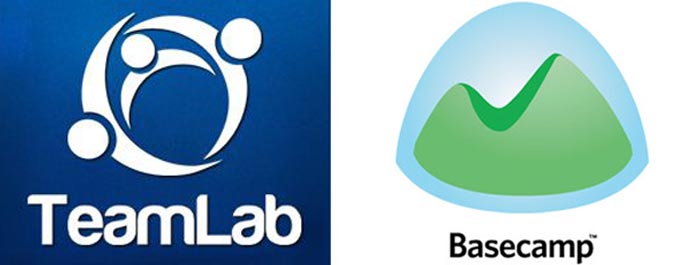Teamlab & Basecamp
When searching for an effective project management and collaboration system, one of the first platforms you will come across is Basecamp. It is a self-proclaimed, ideal platform for online collaboration – existing on the market for longer than any other system.
Let’s be objective however – perfection has no limits and today Basecamp has a great number of competitors which have, in terms of functionality, been continuing to approach the famous collaboration system and even dare to call themselves an alternative. Freedcamp, Rule.fm and Teamlab are among those brave daredevils.
Are their statements reasonable or just another marketing move? Let’s arrange a PM software duel and try to figure it out comparing Basecamp with Teamlab – a collaboration platform which has gained the largest popularity in 6 countries all over the world (according to appappeal.com).
Firstly, let’s admit that Basecamp and Teamlab have overlapping functionalities. Both platforms offer efficient project management tools such as discussions, reports, file sharing, milestones, real-time chat, etc. Both platforms also provide user-friendly interface to simplify project management processes.
But what are the differences?
Which one is better/offers more features?
What makes them unique?
Lets take a look at each system’s features and then comare the two systems side-by-side to see which one is the best choice!
Teamlab
Main Features
According to Appapeal statistical data, Teamlab is the second most popular PM software after Basecamp.
In their own words, Teamlab represents a multifunctional web-office for business collaboration, document and project management, divided into 4 fully-featured modules:
- Project Management
Build teams and assign tasks, schedule project milestones, track project activity and generate reports.
- Collaboration
This module can be compared to a social network developed specially for business. Here team members create posts in blogs and forums, share photos, bookmarks and Wiki pages.
- Document Management
This module appears to be the feature set which makes Teamlab distinguishable from similar platforms. Here users can create, edit, save and share text docs, spreadsheets and presentations directly in the portal and integrate them into the Project module.
- CRM
This module enables marketers to manage their customer relations, keep all the contacts a company works with in one place, assign responsibilities and track work activity, upload, create and save documents, spreadsheets or presentations in a corresponding opportunity or case. For more info, please see the video tutorial on TeamLab’s CRM module.
Deployment Solutions:
Teamlab provides users with 3 deployment solutions –
- Saas
A ready-to-use, cloud-based, business platform.
- AMI EC2
Organizational files on a virtual machine with pre-installed TeamLab.
- Open Source
For developers and experienced users who wish to install and configure the platform manually on their own server.
Pricing
The developers of TeamLab stand for the idea that business software should be affordable for every single company so, believe it or not, Teamlab provides all features absolutely free. Affordability can be a decisive factor when choosing a collaboration platform for small or medium business.
At the same time, if 1Gb (free version) is not enough for your business needs, you can purchase additional storage, priority support and advanced file upload for 49$ per month.
Basecamp
Main Features
37signals offers a suit of 4 products, Basecamp, Highrise, Backpack and Campfire.
- Basecamp
Mostly about project management, collaboration and is aimed at establishing effective communications. Users can assign tasks, set up milestones, discuss the project in via comments – all in a centralized Basecamp dashboard.
- Highrise
Enables you to organize notes and email conversations for up to 30,000 customers and contacts, keep track of proposals and deals and share status with your company, department, or team.
- Backpack
Aimed on effective file sharing. Here you can keep your documents, discussions, and schedules in one place all at the same time.
- Campfire
A web-based group chat tool that lets you set up password-protected chat rooms, invite clients, colleagues or vendors to chat, collaborate and make decisions. Users also can share text, files, and code in real time which appears to be very convenient while discussing a project.
Deployment solution
Basecamp is accessible in SaaS version only and many users complain when servers are unavailable. According to many entrepreneurs, this problem is the main obstacle which keeps them from signing up for a Basecamp account. Though system failures do not happen too often, it can’t be denied that while servers are down, no teamwork is possible.
Pricing
37signals sticks to quite a reasonable pricing policy, although Basecamp is definitely not the cheapest product among similar systems. The company presents several pricing plans, including free, basic, plus, premium and max. The price varies from $0 to $149/month according to the number of projects, users, storage and more.
Registered users are also offered a suite containing all 4 modules (minimal price is $99/month).
When it comes to the free account, the number of features appears to be so limited that, before you read detailed Basecamp reviews, you will never know what makes it so outstanding.
TeamLab vs. Basecamp Feature Comparison:
Free Version
| Storage | Users | Projects | |
| Basecamp | 10 Mb | 1 | |
| Teamlab | 1 Gb | Unlimited | Unlimited |
$49/month Version
| Storage | Users | Projects | |
| Basecamp | 15 Gb | Unlimited | 35 |
| Teamlab | 50 Gb | Unlimited | Unlimited |
Conclusion
Thereby, after comparing Teamlab and Basecamp we come to the following conclusion:
- Basecamp demonstrates its value in practice, justifying the name of the simplest project management software. At the same time it can be a huge problem for some users, since the simplicity is not always the best key for successful collaboration.
- A large number of users find the features Basecamp’s free version significantly limited, while paid version is hardly affordable for small business holders.
- Unlike Basecamp, Teamlab appears to be more user oriented. It combines all the essential tools in one place for free and you only need to pay in the event more storage capacity is needed.
- Another distinguishing feature of Teamlab is that the developers suggest alternative deployment solutions for those who want to be independent from the vendor. Thus you can deploy Teamlab Open Source or Teamlab AMI and get full control of the data, stored in the portal.
- Finally, while it is unknown whether Teamlab can conquer Basecamp in terms of market share yet, it is definitely a better solution for small and medium size companies considering its pricing and features combination.



